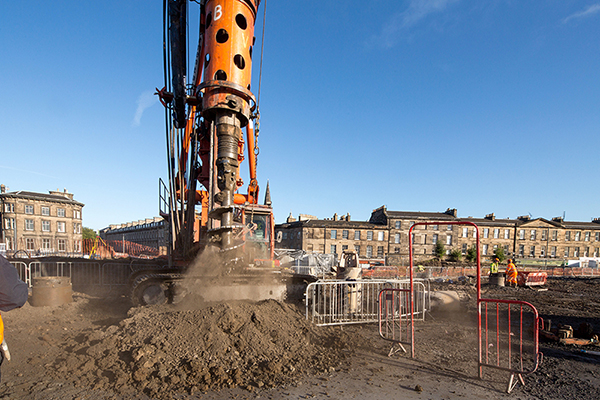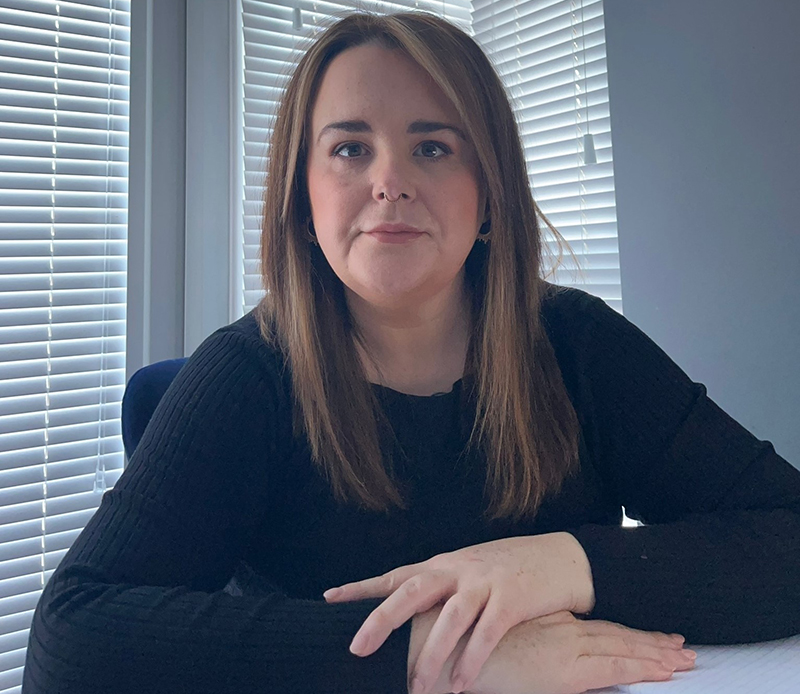
A ground engineering professional with over 20 years’ experience is relishing her role as business stream director in Scotland at Cementation Skanska, after returning to the company where she spent five years earlier in her career.
Emma Haddow discovered her passion for ground engineering while studying at the University of Strathclyde. After graduating in 2002, she dived straight into a career in piling when she landed a role as a contracts engineer.
Since then, Emma has worked on a host of ground engineering schemes for high-profile projects – including V&A Dundee, the Barclays campus and Queen Elizabeth University Hospital in Glasgow, the Royal Bank of Scotland HQ in Edinburgh, and the £350 million Haymarket mixed-use development in the capital.
Her career roles to date include spells as a senior design engineer and senior estimator for Balfour Beatty Ground Engineering, bid leader at Skanska UK, senior design and estimating manager at Van Elle, design manager GE at J. Murphy & Sons, and bid manager at FK Lowry.
She returned to Skanska last year in a senior business and project management position. Emma told Project Scotland she has ambitions of making the company the ‘go-to’ business for ground engineering in Scotland.
“Cementation has a reputation for tackling the technically difficult jobs; we’ve got the experience and capability in-house to deal with them,” Emma said, before telling how the company dealt with challenging conditions on the Barclays project due to the running sand that is ‘typical of Glasgow’. Large diameter rotary bored piles using bentonite were used to support the main structure for each pile bore.

“My priority in Scotland is becoming that first port of call for people when they have a conceptual idea, or a consultant has a scheme that’s maybe been floated to them,” Emma added. “We want to be the people they pick up the phone to and say: ‘I’m in this area of the country, what do you think we need to do and how do we do it?’ Building that relationship is how we get on board early and that’s something I’m really focused on for Cementation in Scotland, as it’s a really good foundation to build upon.”
Emma is confident that her technical experience in the field will benefit her business role as it enables her to offer a different perspective, with her focus being on all aspects of a project from the pre-construction stage right through to completion.
“I think that having a bit of technical knowledge is a really valuable thing because building relationships with clients and ensuring they know they can speak to someone who can give them facts and data is so valuable,” she added. “I try to get involved as early as possible and because of that technical engineering experience, I can help add in a bit of value engineering here and there and help the client come up with the best layout.”
Keen to breed this level of versatility throughout the company, Cementation apprentices spend three years learning and developing in a variety of different roles, in order to have a clear and varied progression route once fully qualified.
“We’ve got members of our team who have been with Cementation Skanska for over 44 years, so there’s so much experience there and the relationships are really tight,” Emma continued. “You’ve got young engineers that are only at the company six months but are part of that team – we really do forge a team atmosphere, so the communication is really open; we encourage people to talk and learn from these guys.”
One of the biggest selling points for the ground engineering sector is that no two days are the same. Emma revealed that teams could be working on overhead lines in the Highlands a mile apart from their colleagues, but then the next project could take them to a bustling city centre where they’re surrounded by crucial infrastructure – such as the Edinburgh-Glasgow line, as experienced on the Haymarket job.
“When we finish on-site, there’s still nothing there, as everything we do is below ground,” Emma added, when asked what the sense of achievement is like once structures such as the Barclays campus are completed. “It’s not until it’s finished, and we go back and look at it that we can see the full picture and then you’re like ‘wow’ – sometimes you don’t realise the full extent of it until its complete.
“Probably the best project for me – because of where I stay near Motherwell – is the Raith interchange. It was a big job we did back in 2007 and at the time was one of the biggest projects Cementation had done. I drive through that underpass three or four times a week, so it’s one of the most prevalent ones and I’ve got a lot of good memories – I feel quite proud when I see it and think about all the team involved.”
Another aspect of Emma’s work in her new role is visiting schools and paying particular attention to girls showing an interest in the sector. Admitting that it wasn’t always easy being a female entering such a male-dominated industry, Emma said she is happy to say that things have changed ‘immensely’ over the past two decades – with almost half of Cementation’s graduates being female.
“Diversity is actively encouraged now and recognised to be essential and beneficial to the industry, whereas that may not have been the case 10 years ago,” Emma said, revealing that there’s ‘nothing better’ than seeing young girls get passionate about the industry.
“People are seeing the benefit of having a lot of different backgrounds in their team,” she enthused.








